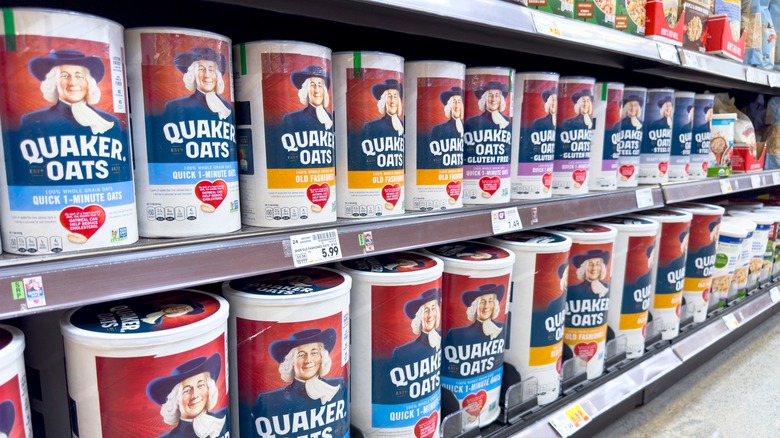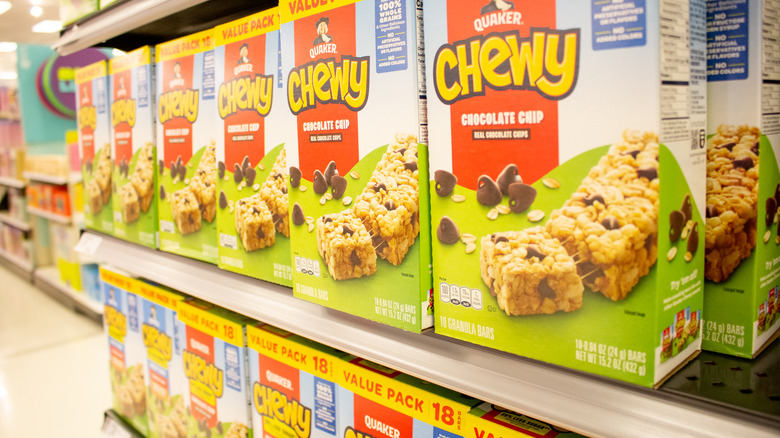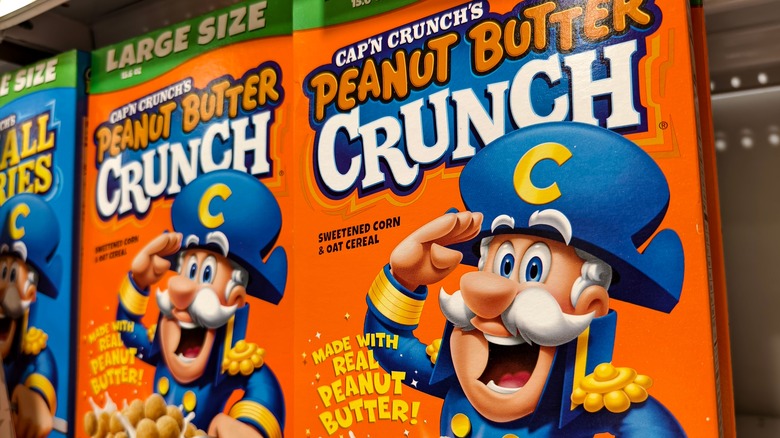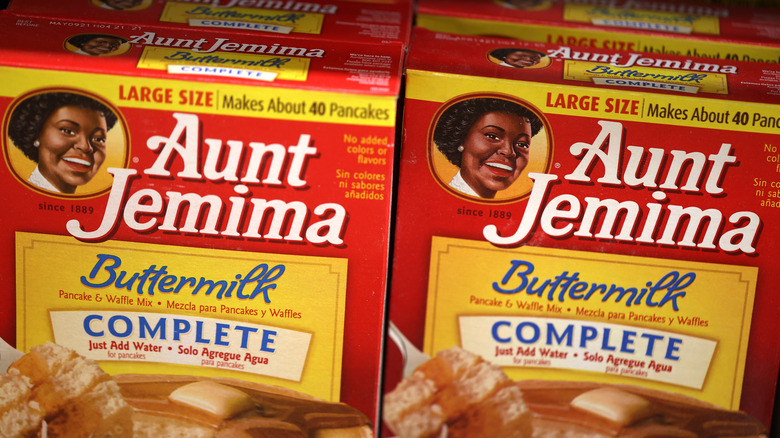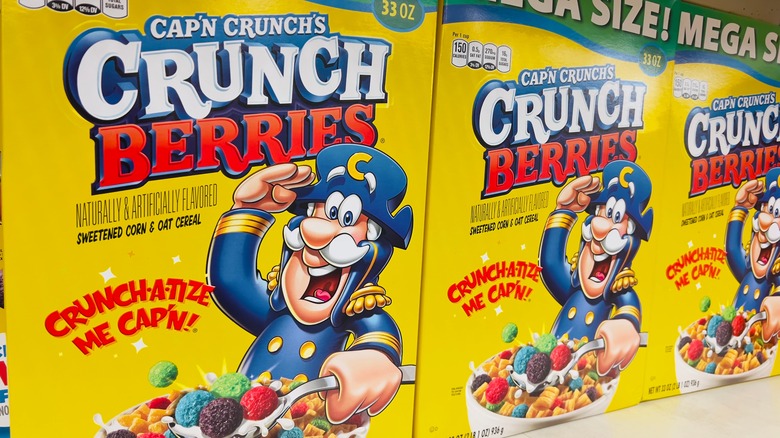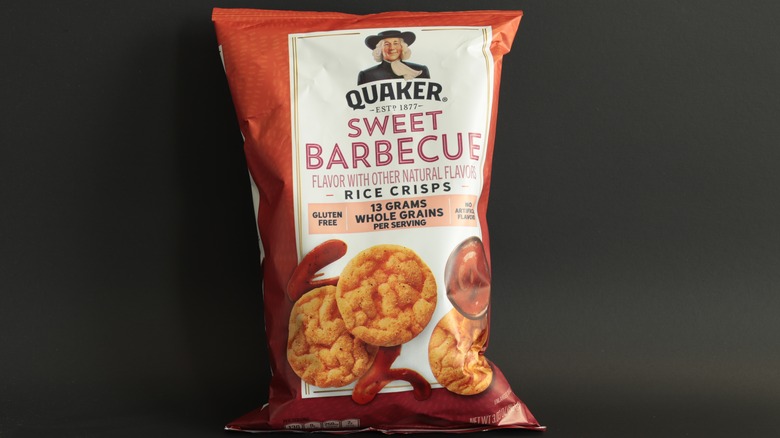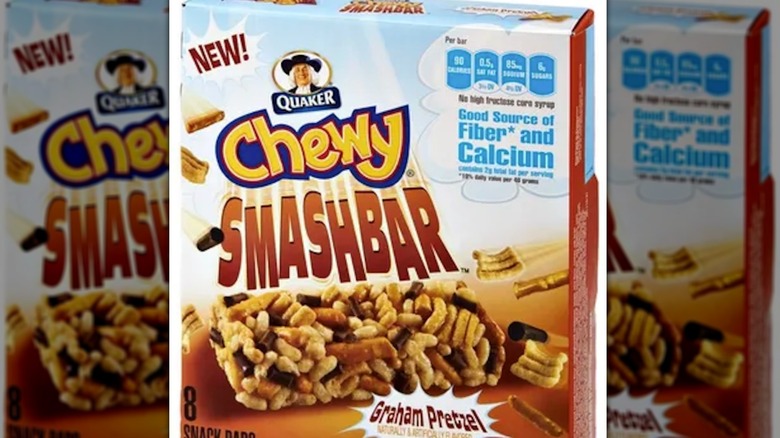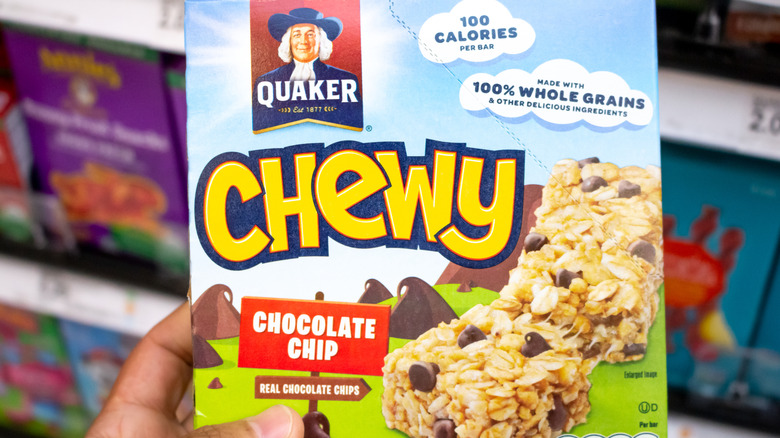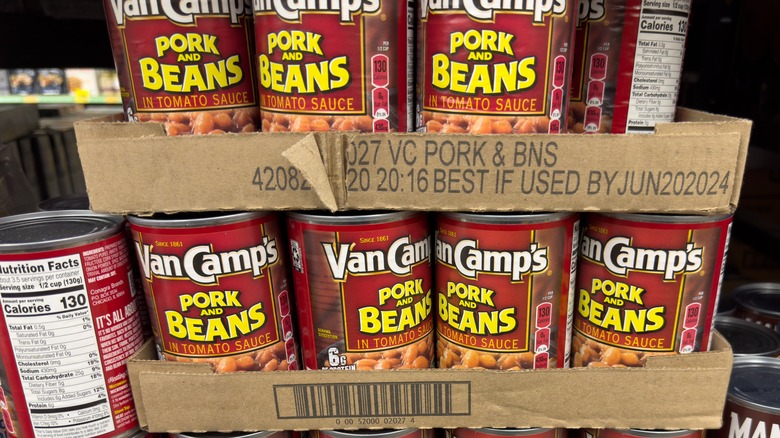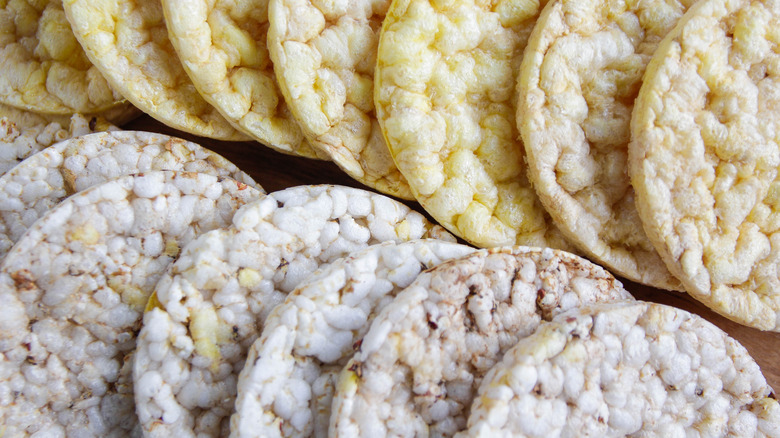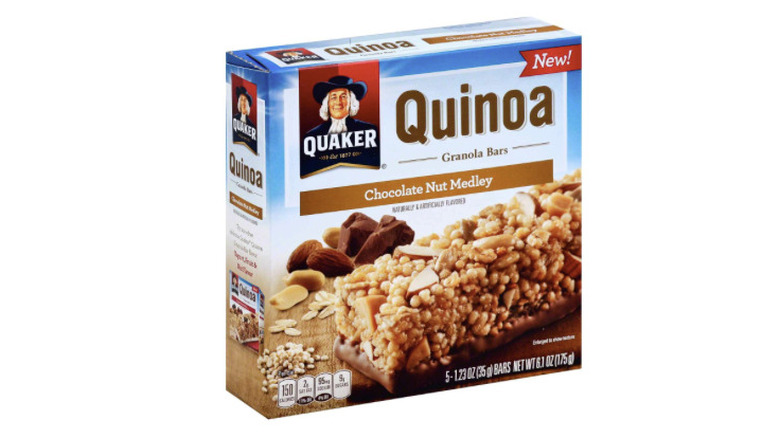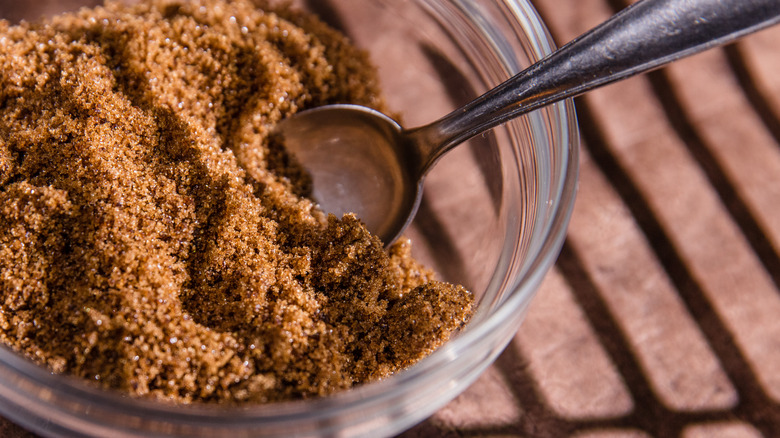Quaker Oats Recalls That Affected Millions
Quaker Oats is one of the oldest and consequently most familiar food brands in the U.S. Dating back to 1877, the company began with trademarked cereal products, namely cans of rolled oats bearing the image of a man in traditional Quaker dress, one of the most influential food mascots ever. Over the past century and a half, Quaker has evolved from just a humble proprietor of oats and cereals. Since a 2001 merger with a soft drink giant, one of the biggest moments in Pepsi's 125-year history, Quaker is now a multi-national packaged food conglomerate that oversees hundreds of products, presides over many subsidiaries and other brands, and feeds millions of people a year. Its various cereals and granola products are just some of the reasons to pay attention to the breakfast aisle.
That's a big operation that involves a lot of people, logistics, and other moving parts, and occasionally some very dangerous things got into where they didn't belong and tainted large numbers of Quaker products. In the past few decades, Quaker has worked with the Food and Drug Administration to issue multiple recalls of its products in order to quickly prevent outbreaks of food-borne illness or its customers suffering internal or external injury. Here are the biggest recalls ever undertaken by Quaker Oats.
More than 60 granola products
The most recent Quaker Oats recall included a wide array of granola-oriented products distributed to all 50 U.S. states and territories like Guam, Puerto Rico, and the Northern Mariana Islands. In December 2023, Quaker announced a recall of more than 40 granola products, including many of its Chewy granola bars, cereals, and snack items co-branded with Frito Lay. The problem: There was a chance they all could have been carrying salmonella, a food-borne bacteria that can cause diarrhea, cramps, fever, nausea, and headaches. And then in January 2024, Quaker recalled more than 20 other products — granola bars, cereals, cereal bars, a protein bar, and a snack mix. In terms of products affected, it's the most voluminous recall ever for Quaker.
Profits for Quaker dropped slightly in the wake of the recall, and following an internal investigation, the company announced in April 2024 that it would close down the place where the salmonella contamination had occurred: a plant in Danville, Illinois. Quaker closed the operation, where production had already ceased, previously in operation for more than 65 years. And all those efforts were probably worth it: No cases of salmonella infection related to the consumption of those particularly Quaker Oats products were reported.
Cap'n Crunch's Peanut Butter Crunch
Quaker Oats manufactures and distributes the Cap'n Crunch line of cereals, including Peanut Butter Crunch. In 2018, the company suspected that a small shipment of the cereal produced during a certain period of time for a handful of stores may have harbored salmonella. Those who consume the bacteria may suffer from a host of gastrointestinal symptoms, and it's especially tough on people with chronic illnesses, those over the age of 65, and children — the target audience for Peanut Butter Crunch. The severity of salmonella contamination is such that Quaker deemed a recall of only 21 boxes of Peanut Butter Crunch worth it, discovered to have been shipped to five stores in total — three Super Target stores in Nebraska and Kansas, and two P-Fresh outlets in Missouri.
Targeted salmonella testing led to an exact pinpointing of the infected batch, and the potentially contaminated boxes were quickly recalled. No illnesses related to Peanut Butter Crunch were reported.
Aunt Jemima Pancake Mix
Quaker Oats' first attempt at a product recall over concerns of salmonella-infected foodstuffs came in 2008. It covered three different pre-packaged dry pancake and waffle mixes sold under its Aunt Jemima brand name (which rebranded in 2021 to the less racially problematic Pearl Milling Company). The recall called for customers to not eat or return several possible salmonella-laced products, including Original, Original Complete, and Buttermilk Compete, all varieties under the Pancake & Waffle umbrella line, and in both 2-pound and 5-pound quantities.
Not every box of Aunt Jemima Pancake & Waffle Mix produced in 2008 was believed to be at risk, only certain packages produced at a certain place at a certain time. Quaker Oats determined that approximately 1,000 boxes were potentially tainted, but they'd been sent out to stores in 17 states. Also limiting the impact of a widespread salmonella outbreak: The bacteria would have died upon the mix's proper use as a base for pancakes and waffles cooked on a griddle or in an iron at a high temperature. To contract a salmonella infection from the targeted Aunt Jemima Pancake & Waffle Mix would've required eating the powder raw or as part of uncooked batter.
Cap'n Crunch
Quaker Oats doesn't only manufacture and package food — it was also by default a major toy distributor in the form of the premiums and prizes included in boxes of children's cereal. Now a dying phenomenon, cereal box prizes grew up with us, and they were an effective method to get kids and their parents to choose one cereal over another in the early 1990s, which is when Quaker-made Cap'n Crunch, a breakfast cereal that makes the most delicious cereal milk, offered a toy popper inside specially marked packages of three different products.
Many millions of boxes of regular Cap'n Crunch, Cap'n Crunch's Crunch Berries, and Peanut Butter Crunch included the item, a hollow rubber sphere that flies into the air of its own volition a few seconds after it's forcefully pressed down. But the popping effect works without a surface, and so many kids decided to pop the popper into their faces and eyes that they received minor injuries like eye pain and facial bruising. After 36 reports of children hurting themselves with the toy were filed, Quaker decided to recall all boxes of Cap'n Crunch which offered the rubber sphere. In terms of units managed, it's the biggest recall Quaker ever attempted — 8.3 million boxes were ordered back.
Sweet Barbecue Rice Crisps
Quaker's Rice Crisps are a low-fat, bite-size mash-up of potato chips and rice cakes. Made of rice instead of potatoes, the snack crackers contain much less fat and lots more whole grain than any of its fried, not popped, competitors. Quaker has to load up the otherwise low-flavor Rice Crisps with lots of seasoning, such as it does with the Sweet Barbecue variety. In early 2021, Quaker had to recall that specific style of Rice Crisps due to an ingredient possibly present and not listed on the packaging.
The snacks were found to contain soy, a common food allergen, and when Quaker discovered that trace amounts may have made its way into the stock without a warning label, it instituted a voluntary recall. Sweet Barbecue Rice Crisps distributed to 21 states, a collection of about 4,550 bags in all, were requested to be returned to Quaker, and with no allergic reactions reported throughout the duration of the recall.
Chewy Smashbar Graham Pretzel Bars
In the 2010s, Quaker sold an offshoot of its popular Chewy granola bar line called Smashbar. Billed as "snack bars," they weren't really granola bars but more of a conglomeration of sweet and salty ingredients. The Graham Pretzel Smashbar, for example, included pretzels, graham cracker bits, and chocolate chips.
Sold by the individual bar or in boxes, Quaker ordered a voluntary recall of the eight-count packages of the Chewy Graham Pretzel Smashbar in 2011. The issue was with an unmarked allergen — there were so many components of a Smashbar that the manufacturer overlooked how the final product contained milk, a very common allergen and dietary restriction. Quaker didn't announce just how many boxes of Smashbars reached store shelves, but the recall asked customers to be on the lookout for packages that listed one of 13 different expiration date codes, indicating that were a lot of snacks bars that were otherwise safe to eat for non-milk allergy sufferers, they just neglected to boast a "may contain milk" warning.
Chewy Granola Bars
Not every danger that can affect food and leave consumers in a bad state is a biological threat or a food-borne illness. Foreign, dangerous, and inedible objects, however tiny, may find their way into foods made at massive, factory-style facilities. In 1993, Quaker discovered that some of its most famous line of granola bars may have included an extra ingredient: metal pieces that could have come loose from its factory machinery.
In March 1993, Quaker advised residents of California, Connecticut, Massachusetts, New York, New Jersey, and Rhode Island to not purchase, or not eat if they'd already purchased, chocolate-chip flavored Chewy Granola Bars. Research indicated that the bars hadn't even arrived at stores by the time Quaker discovered that up to 1,600 cases of the snacks may have been contaminated with small shards of metal, which can lead to internal injury if eaten. Quaker asked customers who'd bought one of three different coded lots of the bars to return them to the point of purchase for refunds.
Canned beans and chili
The largest recall ever undertaken by Quaker Oats in its pre-Pepsi ownership era came in 1991, and it involved two products made by a company that is no longer a subsidiary of the cereal goods manufacturer. At the time, Quaker oversaw Stokely-Van Camp Inc., known chiefly for its canned beans and canned bean-based chili sold under names like Van Camp's and Wolf Brand Chili.
During a routine safety check at a manufacturing facility in Dallas, employees discovered that some canned goods hadn't been properly exposed to enough of the heat that makes metal-sealed foods able to safely sit on shelves for months or even years. Not enough heat invites food spoilage, causing cans of beans to swell and allow harmful bacteria to grow and thrive. Stokely-Van Camp determined that the possibly dangerous batches of products were Van Camp's Pork and Beans and Wolf Brand Chili With Beans. Parent company Quaker issued a national recall of 11 different products total. No illnesses from infected beans were reported either before or after the recall took effect.
Apple Cinnamon Quakes
In 2002, Quaker Oats faced the daunting and alarming task of a massive recall of a product because a potential and common allergen used in the production of a food wasn't listed or warned about on the packaging. The item in question: Quakes, a since-discontinued line of miniature, flavored rice cakes. One of the varieties sold was Apple Cinnamon Quakes, a product of which Quaker had to recall 50 to 100 cases.
To build the apple cinnamon flavoring concoction, Quaker used many components, one of which was a dairy product, but only in that one limited quantity. It wasn't much, but Quaker decided that the milk derivative was prominent enough that it could trigger allergic reactions in that part of the population if unknowingly consumed. Some Apple Cinnamon Quakes were produced, packaged, and shipped out with the dairy ingredient, but with no package labeling to warn of the presence of the allergen. Quaker recalled cases of the product that were identifiable because of a particular expiration date.
Quinoa Granola Bars
An infection from the food-spread bacteria listeria can prove especially nasty, leading to diarrhea, fever, and muscle aches at best, and death in severe cases afflicting the immune compromised, including pregnant women, children, and older adults. A very small number of granola bars produced by Quaker Oats in 2016 were discovered to have been exposed to listeria, thus carrying the threat of food poisoning to whoever ate them. And while only a small amount of two different flavors were implicated in the outbreak, they were distributed all over the United States, necessitating Quaker Oats to issue an urgent recall.
The recall urged the return of Chocolate Nut Medley and Yogurt, Fruit & Nut varieties of Quaker Quinoa branded granola bars. At fault were sunflower kernels used to construct the bars, which became infected with listeria at the processing facility before they were delivered to Quaker. Neither before nor after the recall did Quaker field any complaints of food-borne illness from customers who ate either variety of the quinoa bars, making the pullback a success.
Brown Sugar Bliss oatmeal
Quaker Oats released a line of instant oatmeal that gave the customers more of what it wanted in its heat-and-eat breakfast packets — the tastier ingredients, like brown sugar. And thus, Brown Sugar Bliss hit store shelves nationwide, promising a lot of distinctive, velvety sweetness with every bite. The issue with Quaker's Brown Sugar Bliss was that it contained lots more of not just gritty sweetener, but some nuts. Almonds were used in the creation of Brown Sugar Bliss, and it wasn't stated as such anywhere on the product's packaging. A tree nut allergy can be very serious — someone with a known allergy to nuts like almonds can suffer anaphylaxis if they eat the offending foods, a condition in which the pulse slows and airways constrict. As many as 90% of anaphylactic deaths involve nut exposure, so it was of utmost importance and urgency for Quaker Oats to recall the product in 2003.
Quaker figured out that the boxes of Brown Sugar Bliss with almonds added had all come from a single plant in Sparks, Nevada, suggesting that machinery that had previously handled nuts was also used to make the Brown Sugar Bliss. Quaker recalled about 23,000 cases of the product, asking customers to either seek a refund or discard any uneaten oatmeal.
